University students from 42 countries took part in the European Student Festival, coinciding with the 40th anniversary of the first conference. A report from Jelgava (Latvia).
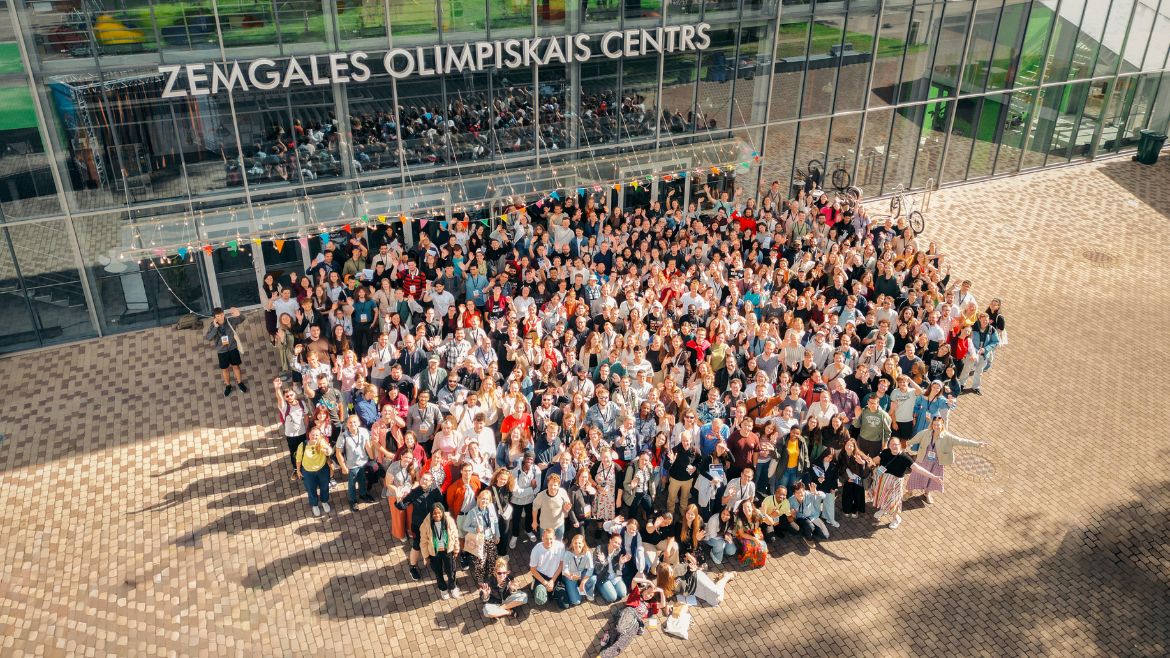 500 students attended the 2025 IFES European Student Festival, in Jelgava (Latvia).
500 students attended the 2025 IFES European Student Festival, in Jelgava (Latvia).
The IFES Europen Student Festival (ESF) took place in the Latvian city of Jelgava, between 16 and 21 August, eight years after IFES held its last student evangelism conference.
“Listening to students and staff from across the continent, I realised how strong the desire was for an IFES Europe conference that reflected our shared values”, said Christian Pichler, director of the event.
After a long wait, around 500 students, volunteers, and staff gathered in August to reflect on mission in the student community. Now, more than a month later, we share how the event went and its impact on the participants and the national movements represented there.
Participants enjoyed a gathering centred around a main theme summarised by the motto 'Thy kingdom come'. IFES stants for International Fellowship of Evangelical Students.
Prior to the event, the organisers studied the gospel of Matthew together for more than two months, “letting its structure to shape the festival programme”, explained Pichler.
Forty-two nationalities were represented, with Germany having the largest number of attendees, followed closely by Hungary and Austria.
All participants received a warm welcome in their mother tongue from the presenters of the first evening. Ulvis Kravalis, general secretary of LKSB (IFES Latvia), and Klēra Maldute, a university student from Jelgava. The presenters introduced us to the host culture through traditional music and dance, concluding with the national anthem and a prayer for the country.
The festival was full of diversity and cultural richness. Although English was the working language, the worship times included excerpts, or even entire songs, in various languages: Filipino, Bulgarian, Spanish, Lithuanian and Latvian.
Many of us will undoubtedly add to our most-listened-to playlist songs such as Lai Tava Valstība nāk ('Thy Kingdom Come') by Viktorija Miškinytė, a staff worker at LKSB (IFES Lithuania), and Tavo meilė tarsi upė ('Your Love is Like a River') by Latvian songwriter Valdis Indrišonoks.
“Worshipping in many languages, united in Christ, was like a taste of heaven”, said Pichler.
Small groups, seminars and workshops were key spaces for training and dialogue. It was not easy to divide 500 people into small enough groups to create safe and comfortable spaces for exchanging opinions. However, the ESF more than rose to the challenge.
Jared Michelson and Laura Gallacher were the biblical expositors. Michelson is a theology scholar who works at the University of St Andrews in Scotland, holding both educational and ministerial responsibilities.
Gallacher and her husband lead Saint Thomas' Church in Swansea, Wales. She is also the co-founder and director of the Prisca Initiative, which aims to “equip preachers and speakers in the UK to communicate the gospel in an engaging and effective way in today's cultural context”.
In the first morning session, entitled 'The Son of David', Laura explained that, in Matthew, Jesus is presented as the heir to David's throne, announcing the coming of the Kingdom of God.
Analysing the Sermon on the Mount, the preacher highlighted three key aspects of this kingdom: it is a place of healing for the broken; it provides real help; and it gives us the clear purpose of being salt and light.
The following morning, Jared focused on the authority and power of Jesus in a presentation entitled 'The Messiah', which delved into the passage from Matthew 8:23–34.
Asking and answering questions about evil and suffering in the world, he concluded reflecting on how Jesus is the Messiah who brings hope that everything will get better.
"The Master" was the title of Tuesday's talk, in which Gallacher highlighted Jesus' work in calling, equipping, and sending his disciples to share the gospel.
She also emphasised the need to rest in Jesus and bear his yoke, as he is 'the Shepherd' who cares for and provides for us.
Jared closed the morning plenaries with a reflection on 'The Saviour King'. Christ is the fulfilment of the Old Testament, and his sacrifice opens the door to the reconciliation of humanity with God. “On the cross, God rejects our self-rejection, but are we willing to accept that love?”, pointed out the theologian.
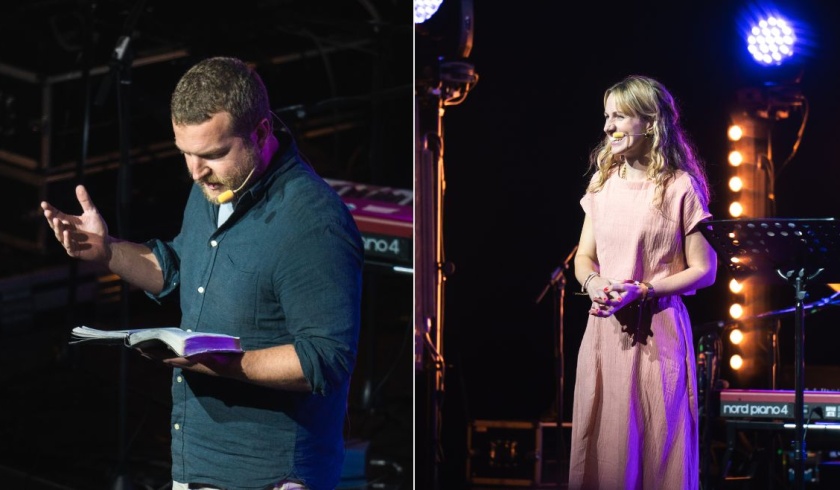
[photo_footer] Jared Michelson and Laura Gallacher during the Bible expositions. / Photo: Markuss Kutumovs [/photo_footer]
On Tuesday 19th August, we took to the streets of Jelgava to share the love of Jesus. Spread across different strategic points in the city, we held outdoor worship sessions, art exhibitions featuring works created during the festival, and summer team games.
We offered free coffee, tea or juice to passers-by, with questions written on their cups that encouraged reflection and, if they wished, interesting conversation.
A group of young people from all over Europe, wearing name badge holders and carrying tote bags, invaded the city. Some refused any drinks, conversation or music, but many others did want to satisfy their curiosity and find out what was going on.
The testimonies about that day are impressive, such as that of Joel Buschmann (SMD, IFES Germany): “Before that day, I prayed for God to guide me during the evangelism time. I asked Him to give me the opportunity to connect with people through sports on the beach and share the gospel with at least one person. God did exactly that.
At first, Pedro Cerqueira (IFES Portugal) and I had a three-hour conversation and discussion with one of the lifeguards.
The second part of my prayer was answered when I played volleyball with three Latvian boys. They didn't speak English and I don't speak Latvian, so we had fun playing and communicating through gestures and emotions for about an hour. We didn't talk about Jesus, but that wasn't my prayer request, rather, connecting with people through sports. And that's exactly what happened”.
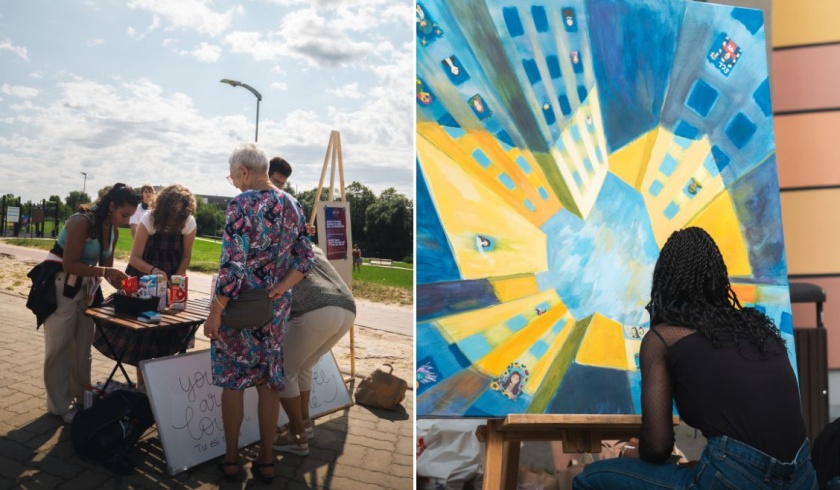
[photo_footer] Groups of people in Jelgava during the Impact day. / Photo: Markuss Kutumovs [/photo_footer]
I also had the privilege of witnessing what I believe was one of the most beautiful moments of the day. We were evangelising in the park, and had spoken to everyone except a group of older women who were talking in Russian, a language none of us knew.
While the rest of the group headed to another area, a Ukrainian girl watched the women from a distance. She was the only one who could speak Russian, but I could see that she was debating whether or not to approach them. I am sure a thousand things were going through her mind.
She finally approached them, and although the conversation wasn't very long, for me — and I hope for them as well — it was one of the greatest displays of God's transforming love and forgiveness that I have ever seen.
Another unforgettable experience was watching a performance of the 'Mark Drama', a 90-minute play featuring 15 people and based on the gospel of Mark.
The play is full of peculiarities: there are no period costumes, microphones or stage. The circular arrangement of the chairs allows the actors to move among the audience, making the audience part of the play.
Furthermore, the performers only have three days to rehearse before the opening show. They only learn the role they will be playing at the first rehearsal.
Pulling off this experiment seemed impossible enough, but this time there was an added difficulty: doing it during the festival.
”Honestly, I don't know how we managed to rehearse”, said Silas Walter, BCSU (IFES Bulgaria) staff worker and director of the play.
In addition to having to practice during free time while also participating in the other activities, there was the challenge of a team of international actors. For many of them, it was their first time performing in the play, or at least performing in a foreign language.
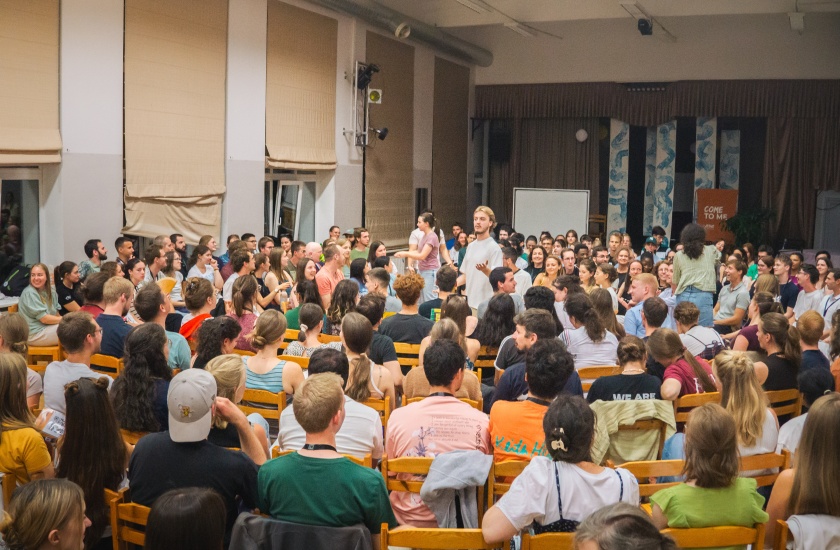
[photo_footer] Representation of Mark Drama. / Photo: Markuss Kutumovs [/photo_footer]
“Maintaining the balance between Mark Drama and the festival was difficult”, pointed out Bulgarian student Dani Ivanova, “but I think sharing this experience brought us closer as friends”.
Ultimately, “Mark Drama was an example of how God can achieve great things through us, not through our own strength, but through Him and His Spirit”.
The evening sessions mainly sought to connect with the various initiatives and commitments within the IFES ministry.
Sunday evening was a reminder of the IFES's commitment to Scripture, and the time of exposition of the Word was an inductive Bible study, guided in each of its phases (observation, interpretation and application) by a different person: Eva Petržílková, Jonathan Clark and Simon Cowell.
On Monday, the evening focused on the proclamation of the Kingdom of God. We heard several personal stories that presented us three models of evangelism: Amanda Otero (Spain) on personal evangelism; Marina Gnatyshyna and Solomia Sapsay (Ukraine) on small group evangelism; and Michael Ots on public proclamation.
To close, Gnatyshyna meditated on the story of the eunuch in Acts 8:26-40. “The public proclamation of the gospel begins with God, not with human plans”, said Marina.
“It is not only public, but also personally appealing and centred on Jesus and the Bible; moreover, it demands a response”, she concluded.
The initiatives Engaging the University, Good News for University and Graduate Impact played a leading role on Tuesday evening.
Thanks to the first initiative, IFES — as a ministry made by and for students — provides resources to help students understand where God has sent them to carry out their mission at this time in their lives.
Likewise, the second initiative aims to connect each field of study with the Gospel and to contact evangelical academics who wish to contribute to this.
The third initiative focuses on continuing to impact society beyond our time as students.
The biblical speakers for the evening were Emma Díez and Christel Lamère Ngnambi.
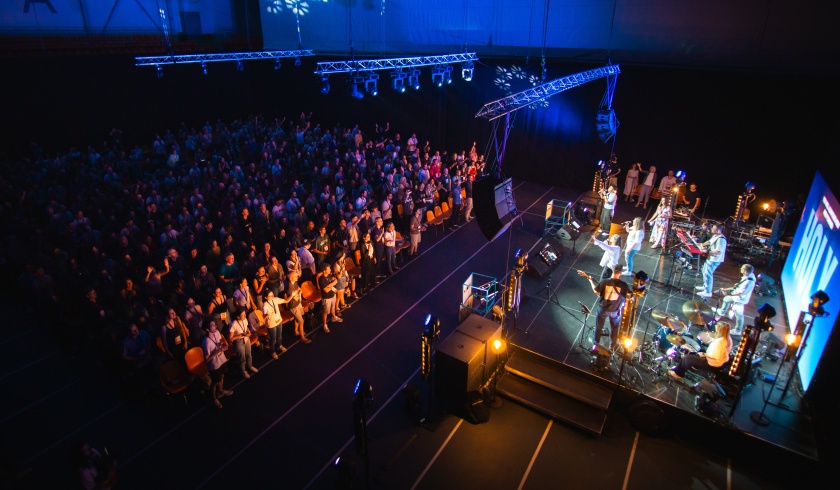
[photo_footer] The audience during the European Student Festival. / Photo: Markuss Kutumovs [/photo_footer]
On Wednesday evening, the focus was on the various questions and concerns of the human heart, which reveal how broken humanity is, as some of us may have observed throughout Impact Day.
Igors Rautmanis used his own testimony as a starting point to talk about depression and mental health. Jared Michelson spoke about sexuality, and Francina de Pater concluded the evening by reminding us of the importance of self-care and renewal through resting in Jesus.
The famous passage, 'All authority in heaven and on earth has been given to me. Therefore go and make disciples of all nations”, was read in 19 different languages on the last night of the conference.
Remi Tobler then led a reflection, connecting this biblical text with IFES International Student Ministry and other testimonies shared throughout the evening.
David Montgomery, general secretary of IFES Europe, closed the event by speaking directly to the hearts of each participant, challenging them to take part in the mission of God.
For some, the ESF was a step forward in their relationship and commitment to God, as evidenced by a student who decided to be baptised as a result of the event.
For others, like Eli Piperkova (BSCU, IFES Bulgaria), the event was an opportunity to “learn new perspectives on how God moves and works in other people’s lives”.
Clara Cerqueira (GBU, IFES Portugal) says that attending the festival was a reminder of our role in universitie: “Through the workshops, God showed me that He calls all communities His own, so we should not be afraid to share the Gospel with anyone”.
For me, attending this event was very special. I had the privilege of serving on the prayer team, which allowed me to see the impact that the teachings had on the lives of those who were listening.
I also witnessed God working with and through me throughout the festival, answering many of my prayers. Furthermore, I shared unforgettable moments with old and new international friends, who have earned a special place in my heart.
I wish I could delve deeper into each of the 500 stories and experiences from the European Student Festival, but that would be impossible.
Some of them have been collected on the IFES Europe website and Instagram, which are still being updated.
During the festival, we interviewed Christian Pichler, director of the ESF:
Question. How was the process? Any challenges?
Answer. I’m part of the leadership team of IFES Europe, and over the last twelve years I’ve enjoyed countless IFES events. I love cross-cultural gatherings and the richness they bring. With Kingdom Come, IFES Europe wanted to pick up again the tradition of the European Student Evangelism Conference, first held back in 1985 in the Netherlands.
I had already been involved in planning the eleventh conference, Revive, in December 2019—the biggest one yet, with over 3,000 participants. However, Revive developed into its own organisation, with a different focus and DNA from IFES Europe.
Listening to students and staff from across the continent, I realised how strong the desire was for an IFES Europe conference that reflected our shared values. When my supervisor asked if I’d consider leading this new event, I prayed about it. God gave me a very clear confirmation, and I said yes.
Organising something like this is never simple. Forty countries also means forty different opinions. The first big challenge was deciding on the date and location. Two countries offered to host us, and we chose Latvia—hoping it would bring spiritual impact to the whole Baltic region.
From there the list of cchallenges was long: building a planning team that represented Europe well, finding someone for logistics on the ground, choosing the right venue, theme, and speakers. And we shouldn´t forget that we are in a spiritual warfare. We have an enemy who works against such a huge blessing.
Six months before the event the school next door cancelled our agreement. We depended on it for seminars and sleeping space. Two months before, our caterer pulled out.
Our first planning meeting was in January 2024 in Riga. Team-building was crucial for eleven people from ten cultures.
After the meeting everyone should be on the same page, having a shared vision. We finally decided on the theme and direction of the festival. Two things stood out: the beauty of the gospel and the call to discipleship.
For more than two months we studied the Gospel of Matthew together, letting its structure shape the programme of the festival. After this initial process we split into three main teams focusing on their area the rest of the planning time: plenary, extra-plenary, learning & discipleship.
Communication was another big challenge. How to get students excited across a whole continent? Social media seemed obvious, but in reality we depended heavily on national movements to pass the information on—and that didn’t always work smoothly.
To make things harder, our communications “team” was just one person with ten hours a week, and she was brand new to the job. That’s why having 500 participants from 30 national movements and 42 nationalities felt like a miracle.
Q. What was the highlight for you?
A. After two and a half years of planning, the opening evening was unforgettable. To finally see everything come together—the hall filled with students from across Europe, their excitement, their joy—it was overwhelming.
In that moment all the pressure, setbacks and uncertainty just fell away. Worshipping in many languages, united in Christ, felt like a taste of heaven.
But honestly, the whole festival was a highlight for me. Our logistics coordinator did an incredible job, the speakers were inspiring, and the whole programme—plenary and extra-plenary—happened just as I had envisioned.
Q. Anything else you’d like to share?
A. For me, the European Student Festival was a deep journey of discipleship. When I first sensed God calling me to lead, I told him: If you give me a planning team, a logistics person, a worship leader, and a country willing to host us, then I’ll know you are with me.
Within weeks, all those prayers were answered. That clear confirmation gave me strength and hope all along the way, even through the hardest setbacks.
Looking back, the festival is a testimony that God can do extraordinary things through someone who simply says: “Here I am, send me”.
[analysis]
[title]Join us to make EF sustainable[/title]
[photo][/photo]
[text]At Evangelical Focus, we have a sustainability challenge ahead. We invite you to join those across Europe and beyond who are committed with our mission. Together, we will ensure the continuity of Evangelical Focus and our Spanish partner Protestante Digital in 2025.
Learn all about our #TogetherInThisMission initiative here (English).
[/text][/analysis]

Las opiniones vertidas por nuestros colaboradores se realizan a nivel personal, pudiendo coincidir o no con la postura de la dirección de Protestante Digital.
Si quieres comentar o